June 20, 2025 | 15:34 GMT +7
June 20, 2025 | 15:34 GMT +7
Hotline: 0913.378.918
June 20, 2025 | 15:34 GMT +7
Hotline: 0913.378.918
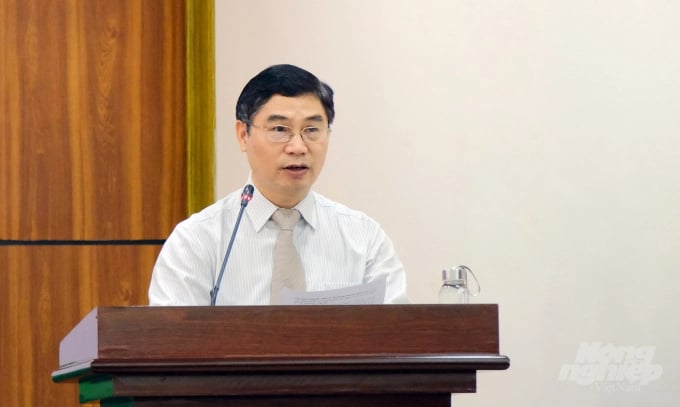
Deputy Director of Plant Protection Department Nguyen Quy Duong spoke at the conference. Photo: Bao Thang.
The event features the attendance as well as series of ideas and proposals from representatives of the Plant Protection Department, FAO, domestic and foreign consultants, and over 100 delegates from bridge points of provinces and cities across the country.
Speaking at the workshop, Deputy Director of the Plant Protection Department Nguyen Quy Duong said that the project aims to develop and implement a National Strategy for Plant Health and a National Plan for Integrated Plant Health Management (IPHM) for the 2021-2025 period. Within the framework of the project, FAO provides technical assistance to review the Integrated Pest Management (IPM) Scheme for the period 2015-2020, and analyze the conceptual framework and global approach of the good practice model in enhancing the plant health and manage pests.
As the focal point of FAO's project in Vietnam, the Plant Protection Department (Pesticide Protection, MARD) believes that this will help comprehensively and systematically manage cross-bordered pests. In addition, the new approach will bring solutions to deal with pest risks in the context of climate change and global economic integration.
"We need to build the IPHM project in the 4.0 technology era, and thoroughly apply technical and digital advances in the studying process, as well as in practical teaching. Through the practical process, we have may consider putting IPHM into training at schools or centers for agricultural extension and technology transfer," said Duong.
It is said that IPHM is rooted or an extended version of IPM, a project that the Department has implemented since the 1990s and has obtained many encouraging results over the years. The main difference between the two programs lies in the approach.
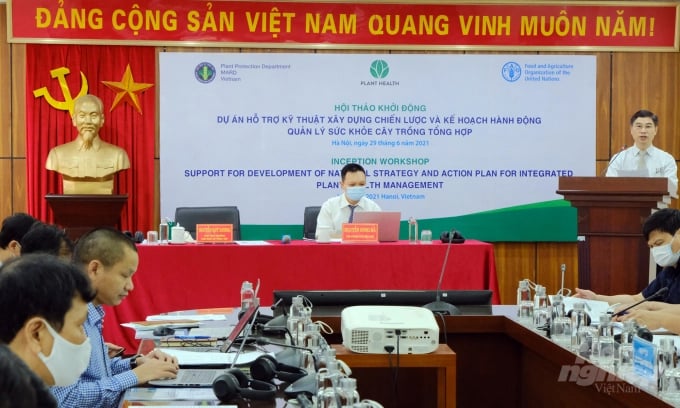
The inception workshop. Photo: Bao Thang.
While the IPM focuses on pests control, taking that as a basis to protect crops and focus solely on agriculture, IPHM considers crop health the main object. IPHM\'s measures are mainly directed at pest control. Besides agriculture, IPHM also targets other stakeholders affecting the industry.
At the workshop, from the bridge point in Thailand, Dr. Yubak- FAO’s senior technical officer said that over the last 25 years, Vietnam has strived to be one of the leading exporters of rice, coffee, pepper… exporter. Since joining WTO and integrated into the global economy, Vietnam joined in series of programs to ensure trade sustainability and proposed several solutions for plant protection. Vietnam agriculture selects to approach plant health to help farmers accumulate more income, ensure health and nutrition for people as well as protect the ecosystem.
“FAO is working with several countries to create a public playground for sharing experience and implement systematic manners on plant health- FAO’s priority,” said Yu Bak, citing examples of other countries building up plant health namely Australia, US among others.
FAO representative in Vietnam Nguyen Song Ha said that in two years of 2019 – 2020, FAO cooperates with the Plant Protection Department to prepare dossiers for the project, which was approved to be invested with USD 400,000, instead of USD 300,000 for a similar project. The investment shows the huge expectation and significant strategic meaning of the project.
Ha said that the project is a premise to bring basic change to the way of approaching plant protection and the cultivation industry. Due to the impacts of climate change, pandemics… it is necessary to have a new manner to protect the plant.
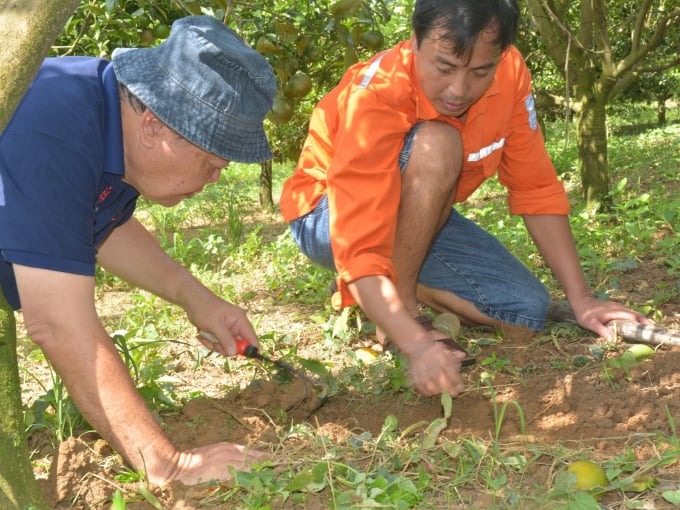
IPHM's "One Health" approach goes into the whole of solutions that not only ensure pest and disease control for plants, but also harmonize with human health, the environment, and biodiversity. Photo: Le Tan.
He mentioned the concept of “One Health”, which is considered a solution for multiple problems in Vietnam, and “4 betters” including better production, better nutrition, better environment, the better livelihood that go beyond the plant protection to other fields including veterinary, fisheries among others.
Plant health is an element that constitutes the concept of "One Health" (OH), besides human health, environmental health, and animal health. FAO has developed a strategic framework for OH since 2008, based on an analysis of the risks to plant protection that can arise from three aspects related to the intersection of these three health categories. Regardless of which factor is affected, be it plant health, animal health, or human health, OH is also affected, thereby transmitting to the other two factors.
In Europe, FAO experts have shifted from primary pest prevention to programs of investigation, surveillance, and early detection of pests, thereby informing people for proactive eradication. Phytosanitary work is closely followed, even progressing to the issuance of plant passports so that they can be transported smoothly within the EU.
In most countries, FAO promotes crop health promotion through farmers sharing their own experiences with videos and then using this as a repository for everyone to apply. Alternatively, FAO organizes field workshops, combining lesson plans, visual videos with face-to-face training.
According to FAO experts, the content of plant health is IPM but in a broader perspective. In case Vietnam can raise and improve plant health sustainably and effectively, it can be included in the top 15 world's leading agricultural product processing countries.
The project provided by FAO includes three outputs within the implementation plan. The first output that takes place from Q1 in 2021 to Q1 in 2022, is an improved national plant health strategy that mainstream food safety; climate change adaption, and transboundary pest/disease management. The second output is a five-year NP-IPHM 2021-2025 with the integration of food safety, pest, and pesticide risk management developed and rolled out. The last output is training curricula for trainers and relevant government officials consolidated to support the implementation of NP – IPHM.
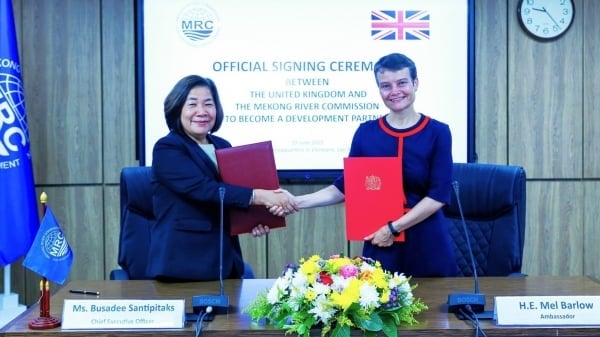
(VAN) On June 19, the United Kingdom officially became a Development Partner of the Mekong River Commission.

(VAN) Biodiversity is being threatened by traditional remedies made from wildlife. Traditional medicine and humans must change to live in harmony with nature.

(VAN) Agrifood investment and finance solutions for people and the planet.

(VAN) Microplastic contamination has become pervasive in seafood, posing unprecedented challenges for food safety and marine ecosystems.
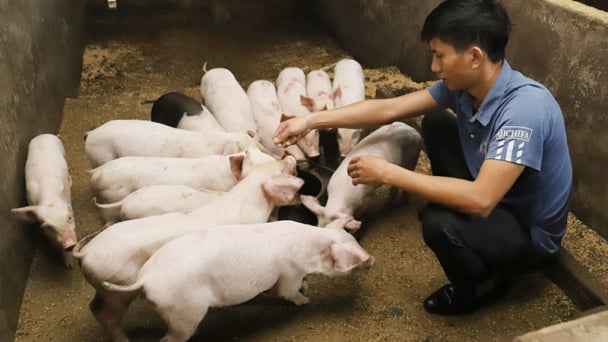
(VAN) Proactively using vaccines, combined with transport control and enhanced surveillance, is the only viable path toward biosecure and sustainable livestock production in Vietnam.

(VAN) Located in the southeast of Ho Chi Minh City, the Can Gio Mangrove Biosphere Reserve is considered the ‘green lung,’ a solid shield protecting the city.

(VAN) To address plastic pollution, closing the plastic recycling cycle will bring significant economic and environmental benefits.